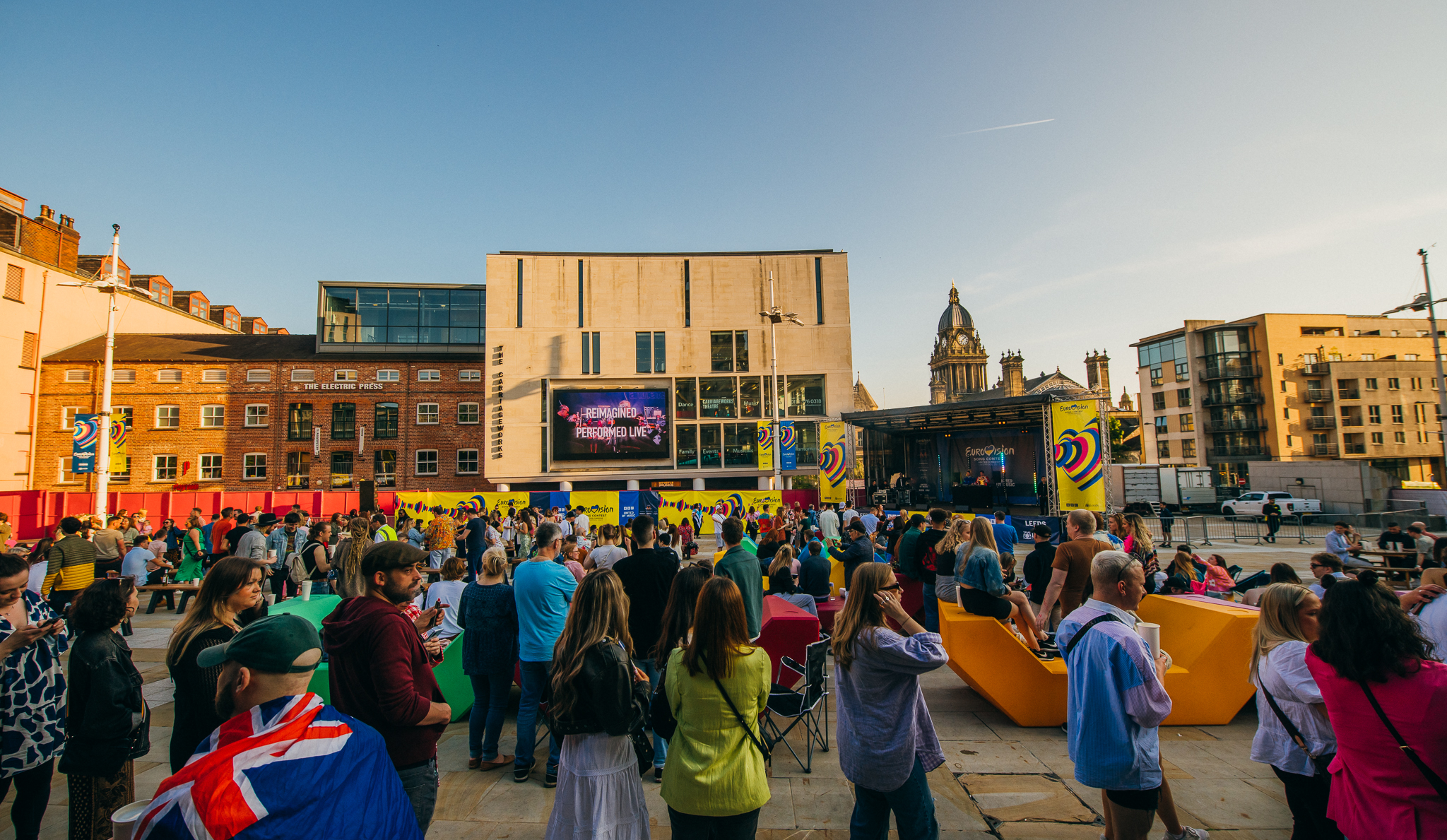

Guidelines
Artwork size and duration
- 1920 wide
- 1080 high
16:9 (landscape)
A 10% safe margin should be used to ensure no information is cropped from the side of the screen.
- 30 seconds
This is our standard advert length. Other timings may be possible – please contact us for details.
- VIDEO
- .mp4 using H.264 or H.265 codec
- Bitrate: Max 15Mbps
- Frame rate: 25, 30 or 60 frames / sec
- Audio: AAC CBR or VBR up to 288Kbps
- STILL SLIDES
- .jpg or .png
- Quality: 100 (high or very high)
- Colour mode: RGB
- Bit Depth: 8 Bits per colour channel
Content guidelines
The Big Screen is a ‘public space broadcasting’ channel. It provides information and entertainment for those viewing it but does not provide the viewer with choice. Any content should minimise thepotential for causing offence and must not infringe legal rights.
- Language
Offensive language is one of the most frequent causes of complaint for broadcasters. Judgementsabout its use are difficult because they depend on tone and context. As a guideline, any contentsubmitted for broadcast should not contain what is generally accepted to be offensive language.
- Violence
Content that appears to condone or glamorise violence and dangerous or antisocial behaviour andcould encourage others to copy such behaviour will not be acceptable.
- Children and dangerous imitation
Children can be influenced by what they see, hear and read. Careful judgement is required forcontent which might lead to dangerous imitation, including content which shows the use ofdomestic objects in violent acts (e.g. knives, hammers and scissors).
- Sex and nudity
Partial/full nudity will not usually be accepted. Likewise, material that portrays sexual behaviour orcontains explicit sexual discussion will not be accepted unless it can be clearly editorially justifiedand then it will only be considered for a late evening broadcast slot.
- Portrayal
Content must avoid offensive or stereotypical assumptions and people should only be described interms of their disability, age, and sexual orientation when there is clear editorial justification.
- Campaigns
The Big Screen can be used to promote factual information but it is not specifically intended tochange people’s behaviour. The screen will particularly support campaigns that are directly linked to Leeds City Council’s priorities – health and wellbeing, children and young people, and communities.
- Links to third-party websites
On-screen web links will be permitted as long as these are justified within the context of thescreening; for example, to provide additional information or background. Any sites must be clearlyrelevant to the content of the video, free to access and factually accurate.
- Product Placement
Product placement and sponsorship logos are not allowed in any explicit manner. Video contentcontaining logos relating to key sponsors are permitted within the credits of the video. Work cannotserve any commercial purpose unless otherwise agreed in advance with Leeds City Council.
- Alcohol, smoking, solvent/drug abuse, illegal drugs
There must be a balance between reflecting public attitudes and realism and the danger ofencouraging potentially damaging or illegal behaviour, particularly among children. For broadcaston the Big Screen, content should not encourage, glamorise or condone the use of illegal drugs,smoking, solvent abuse or the misuse of alcohol. It is understood that concert clips, musicalproductions and dramatisations of social activities may contain images of some of the above. Thisonly becomes an issue of debate if the images are stylised to appear unduly appealing.
- Suicide, attempted suicide and self-harm
Suicide, attempted suicide and self-harm should not normally be portrayed. If it is, it should be donewith great sensitivity. Care must be taken to avoid describing or showing methods in any greatdetail, and content producers should be alert to the dangers of making such behaviour attractive tothe vulnerable.
File delivery and deadline
Files under 10MB can be emailed directly, files over 10MB can be sent via WeTransfer or Dropbox to the Leeds Big Screen email address. Please provide the campaign start and end dates.
- 10 working days
Artwork needs to be delivered 10 working days prior to campaign launch for approval, loading and scheduling. Any artwork delivered late is not guaranteed to run on time.
- Invoicing
When applicable, please provide a valid PO number prior to the campaign start. Invoices will be raised at the start of each campaign.
Leeds Big Screen
Millennium Square,
Leeds
LS2 3AD
© 2023 Leeds City Council
Leeds Big Screen
Millennium Square,
Leeds
LS2 3AD
© 2023 Leeds City Council
Privacy Overview
| Cookie | Duration | Description |
|---|---|---|
| cookielawinfo-checkbox-advertisement | 1 year | Set by the GDPR Cookie Consent plugin, this cookie is used to record the user consent for the cookies in the "Advertisement" category . |
| cookielawinfo-checkbox-analytics | 11 months | This cookie is set by GDPR Cookie Consent plugin. The cookie is used to store the user consent for the cookies in the category "Analytics". |
| cookielawinfo-checkbox-functional | 11 months | The cookie is set by GDPR cookie consent to record the user consent for the cookies in the category "Functional". |
| cookielawinfo-checkbox-necessary | 11 months | This cookie is set by GDPR Cookie Consent plugin. The cookies is used to store the user consent for the cookies in the category "Necessary". |
| cookielawinfo-checkbox-others | 11 months | This cookie is set by GDPR Cookie Consent plugin. The cookie is used to store the user consent for the cookies in the category "Other. |
| cookielawinfo-checkbox-performance | 11 months | This cookie is set by GDPR Cookie Consent plugin. The cookie is used to store the user consent for the cookies in the category "Performance". |
| CookieLawInfoConsent | 1 year | Records the default button state of the corresponding category & the status of CCPA. It works only in coordination with the primary cookie. |
| elementor | never | This cookie is used by the website's WordPress theme. It allows the website owner to implement or change the website's content in real-time. |
| viewed_cookie_policy | 11 months | The cookie is set by the GDPR Cookie Consent plugin and is used to store whether or not user has consented to the use of cookies. It does not store any personal data. |
| Cookie | Duration | Description |
|---|---|---|
| __cf_bm | 30 minutes | This cookie, set by Cloudflare, is used to support Cloudflare Bot Management. |
| Cookie | Duration | Description |
|---|---|---|
| _ga | 2 years | The _ga cookie, installed by Google Analytics, calculates visitor, session and campaign data and also keeps track of site usage for the site's analytics report. The cookie stores information anonymously and assigns a randomly generated number to recognize unique visitors. |
| _gat_UA-109219134-1 | 1 minute | A variation of the _gat cookie set by Google Analytics and Google Tag Manager to allow website owners to track visitor behaviour and measure site performance. The pattern element in the name contains the unique identity number of the account or website it relates to. |
| _gid | 1 day | Installed by Google Analytics, _gid cookie stores information on how visitors use a website, while also creating an analytics report of the website's performance. Some of the data that are collected include the number of visitors, their source, and the pages they visit anonymously. |
| CONSENT | 2 years | YouTube sets this cookie via embedded youtube-videos and registers anonymous statistical data. |
| Cookie | Duration | Description |
|---|---|---|
| _fbp | 3 months | This cookie is set by Facebook to display advertisements when either on Facebook or on a digital platform powered by Facebook advertising, after visiting the website. |
| fr | 3 months | Facebook sets this cookie to show relevant advertisements to users by tracking user behaviour across the web, on sites that have Facebook pixel or Facebook social plugin. |
| VISITOR_INFO1_LIVE | 5 months 27 days | A cookie set by YouTube to measure bandwidth that determines whether the user gets the new or old player interface. |
| YSC | session | YSC cookie is set by Youtube and is used to track the views of embedded videos on Youtube pages. |
| yt-remote-connected-devices | never | YouTube sets this cookie to store the video preferences of the user using embedded YouTube video. |
| yt-remote-device-id | never | YouTube sets this cookie to store the video preferences of the user using embedded YouTube video. |
| yt.innertube::nextId | never | This cookie, set by YouTube, registers a unique ID to store data on what videos from YouTube the user has seen. |
| yt.innertube::requests | never | This cookie, set by YouTube, registers a unique ID to store data on what videos from YouTube the user has seen. |

